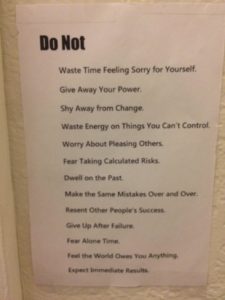
Life is 10% what happens to you and 90% how you react to it. – Charles R. Swindoll.
Truth. How we react can be more powerful than the events that happen to us.
So what happens when you find yourself in a less-than-ideal situation, more specifically, a toxic work environment wondering if and when you should quit your job?
Rachel from Chicago, one of our readers, said to me “We don’t always have control of what others do. So how do we handle a toxic work environment? How do you know when to quit your job?
We can manage our mindset, build up our resilience, and confront whoever is responsible, but sometimes the better action is to exit. When you’re struggling with this decision, you can seek advice from family, friends and colleagues, but at the end of the day, the decision is yours.
Below are four ways to assess your situation so you can decide if it’s time to exit.
What’s the Big Picture, and is This Job Serving It?
When you received that job offer, you likely did a happy dance and went out to celebrate. Someone said yes!
Let’s take a step back. Why did you accept this job in the first place?
- Is the salary paying your bills and then some?
- Were you supposed to be leading a team of five, a challenge you were psyched for?
- Is the network you’re building valuable?
- Did you want to leverage the company name as a resume builder?
- Is this job a stepping stone to something bigger?
For example, perhaps you really took this job to pay the bills, and your day-to-day responsibilities aren’t that challenging. In this case, you’re not that emotionally or professionally invested in the work.
On the other hand, maybe this job is a stepping stone to something bigger. You may be identifying your mission, the work you want to do, and this job was meant to help get you there.
When this doesn’t work out, it can feel like a blow to the gut because you’ve likely made an emotional and professional investment. If this is the case, see if remedying the situation is a possibility. (More on this below.)
How’s Your Health?
It’s no secret that negativity can directly impact our well-being, whether physically, emotionally or mentally. No job is worth this.
Do you feel down often? Do you feel anxious when arriving at the office?
Take note if the change you’re experiencing is short-term or long-term. Are you more stressed than usual because there’s a short-term project you have to get through, and this is causing tension with your team? If that’s the case, you can stick it out by improving self-care within that time period.
I’m a big fan of meditation. If this doesn’t work for you, try journaling, working out, or scheduling a night out with friends so you have something to look forward to. Cutting down on alcohol during this period also helps.
A glass of wine with dinner when we’re trying to escape the day can easily lead to two, three or four glasses. This can leave us lethargic and anxious in the morning.
To assess if the problem is bigger than this, think about the level of change you’ve experienced. Have you lost or gained significant weight in a short period of time? Are you crying frequently, and is the anxiety overwhelming?
It’s easy to pass off these events as “I’m just tired,” and “I’m just having a bad week.” But these seemingly-minor changes can add up and have long-lasting impact on our creativity and confidence.
If you’re unsure how to track your health, ask a close family member or friend if they notice a big change. If they express concern over your well-being, perhaps it’s time to reconsider sticking it out.
Is Your Work Suffering?
Work should be a vehicle to our creativity contrary to the popular notion that work is “work” and isn’t meant to be enjoyed. We’ll have tough days, but work should give us a sense of purpose and empower us to make valuable contributions.
Take notice of your performance. Are you making more mistakes? Is criticism from your boss or team preventing your growth and creativity?
If your work is suffering, and you’re not growing, it’s time to rethink how you’re spending your time. After all, time is one of our most precious resources.
Bills, Bills, Bills
Many of us need to work. Bills have to get paid, and we need to put food on the table, so considering our financials is a must.
The first place to start is listing all of your benefits: salary, 401K, health insurance.
Then ask yourself: How big of a priority are your financials and benefits in your current life stage?
For example, if you have a health condition, benefits are a must. Similarly, if you have children or are planning to start a family, you may have less flexibility. You may be thinking about college funds, doctor appointments and so much more.
Take stock of where your finances fall on your list of priorities. If this is a big priority for you, it doesn’t mean you’re forever trapped. It just means you may need more time to execute on your exit strategy.
There’s always a Solution
Feeling trapped in an environment that doesn’t serve us but holds us back is suffocating. This should never be the case, and we should arm ourselves with the tools necessary to make an exit, whether that’s an emergency savings account, skills that make us invaluable (i.e. entrepreneurial skills and negotiation skills), and a support system of family, friends and reliable colleagues.
Additionally, before you decide to leave, have an honest conversation with your team or manager. Giving someone the benefit of the doubt is powerful. Sometimes others don’t realize the negative impact their actions have on us. This can also include asking for help if you’re drowning, and saying no to new projects.
Finally, if the other person has negative intentions and talking it out hasn’t made a difference, stand up for yourself. Bring in human resources or another intermediary if you have to. No one has the right to be abusive or condescending.
Laura Meyer, client executive to Apple at IBM, shared the following image with me.
Toxicity can have negative long-term ramifications on our health, relationships, work and so much more. Assess the situation based on your priorities and needs, and set a strategy to either exit or to make it work for you.
And finally, as Laura says “If you have to leave, leave with class. Don’t burn bridges. We can often learn just as much from bad experiences as we can from positive ones.”



